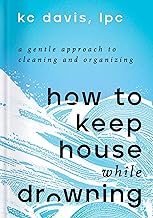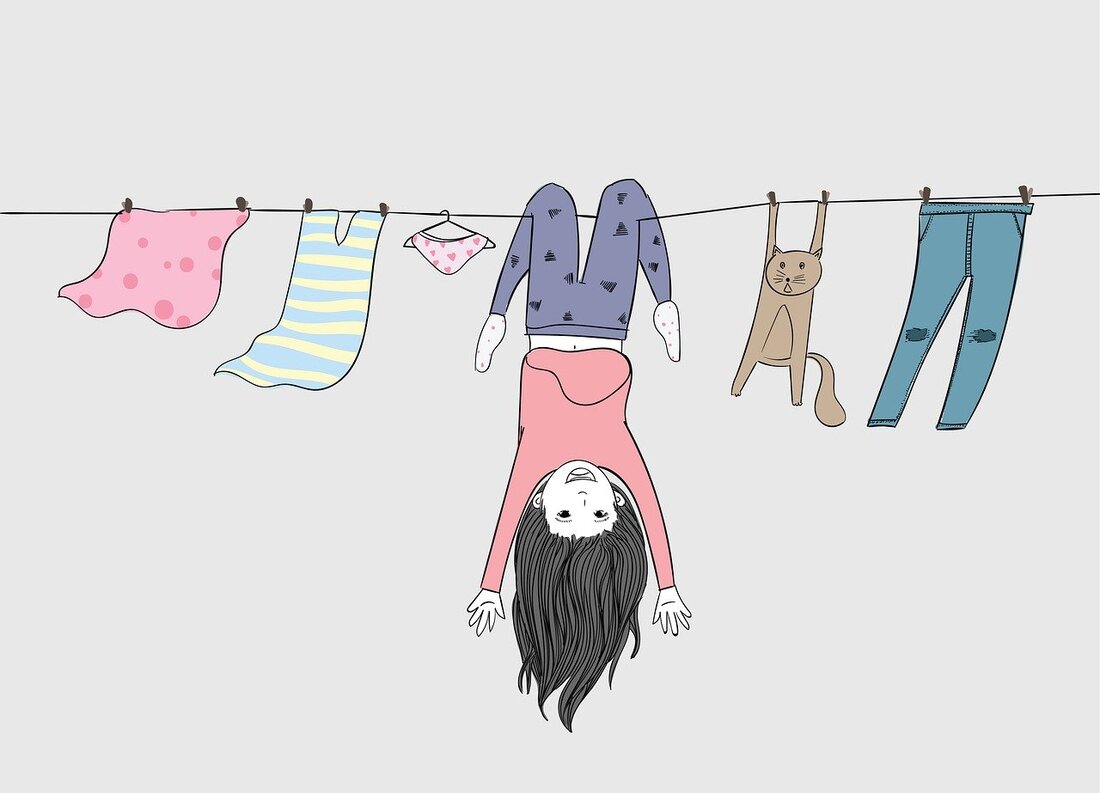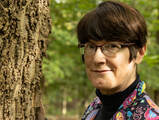| I’m not sure how this book got on my radar, but How to keep house while drowning was definitely worth the read. The author, KC Davis, provides many ingenious ways to make household chores less effortful, based on her experiences raising two small children with postpartum depression during the pandemic. Instead of cleaning the house, she suggests “resetting the space. Cleaning is endless. Resetting the space has a goal.” Another suggestion is to identify simple things that make life easier: such as laying out clothes the night before to make the morning routine easier. |
She advocates gentle self-talk rather than guilting ourselves into getting off the couch to do a chore. She says this isn’t “a formula guaranteed to make you get up…But you know what? You weren’t getting up when you were being mean to yourself either, so at least you can be nice to yourself. No one ever shamed themselves into better mental health.”
Ask for help during stressful times: “there is something about the presence of another person that can make doing tasks easier.” I experienced this when my spouse was in the hospital and I simply couldn’t keep up at home. My mother graciously helped me restore order in the house and my friend Jody helped me clear enough space in the garden to plant vegetables.
She also advises prioritizing critical tasks, such as stacking dishes to clear the kitchen sink, rather than cleaning the entire kitchen top to bottom, which may become a stumbling block to doing anything. And it’s not a requirement to complete the entire task. “Perhaps I wipe down the counters and the microwave one week; the next week I’ll do the stove.”
Ask for help during stressful times: “there is something about the presence of another person that can make doing tasks easier.” I experienced this when my spouse was in the hospital and I simply couldn’t keep up at home. My mother graciously helped me restore order in the house and my friend Jody helped me clear enough space in the garden to plant vegetables.
She also advises prioritizing critical tasks, such as stacking dishes to clear the kitchen sink, rather than cleaning the entire kitchen top to bottom, which may become a stumbling block to doing anything. And it’s not a requirement to complete the entire task. “Perhaps I wipe down the counters and the microwave one week; the next week I’ll do the stove.”
| An entire chapter is devoted to divvying chores between partners: “The goal should not be to make the work equal, but to ensure that the rest [time] is fair. …I believe the moral gut check here isn’t ‘Am I contributing enough?’ but ‘Am I taking advantage of someone else?’ …having a limited capacity is not the same as being entitled and accepting help is not the same as exploiting others.” This helped me understand why arguing about equitable division of chores never got me anywhere. |
When she wasn't completing one item on her to-do list: “I came up with a hack for ensuring the whole list would get done. I took that item off the list. Now the whole list gets done. ‘But KC!’ you say. ‘The item you took off isn’t getting done now.’ Well, it wasn't getting done when it was on the list either, only now I don’t feel guilty about it. It just goes back to being randomly done when I think about it”
She advocates hiring help if you can afford it: “You don’t have to meet a diagnostic criterion to deserve to hire someone to help you with domestic tasks any more than you have to meet a criterion to not have to churn your own butter or knit your own sweaters.”
She advocates hiring help if you can afford it: “You don’t have to meet a diagnostic criterion to deserve to hire someone to help you with domestic tasks any more than you have to meet a criterion to not have to churn your own butter or knit your own sweaters.”
| Other brilliant ideas: put toddlers’ clothes in one closet or room. “This makes dressing everyone in the morning easier, putting laundry away faster (since it all goes into one location), and usually centralizes where the dirty laundry ends up. Bonus points if you can place this location near the washer and dryer.” And try a vertical junk drawer: “a clear hanging shoe rack on the wall or back of the door can ensure you always have a place for small items and that you can see them all easily.” |
Favorite take-aways:
- You don’t exist to serve your space; your space exists to serve you.
- Organization means having a place for everything in your home and having a system for getting it there.
- …the funny thing about doing your best; it never feels like your best at the time. In fact, it almost always feels like failing when you’re in it.
- No person can do all the good things all the time and expecting yourself to just sets up an oppressive perfectionism to which no one can live up. Imperfection is required for a good life.
- The point of having a body is to carry yourself from joyful experience to joyful experience.
- You do not have to wait to care about your body to care for your body. In fact, caring for your body can often cause you to start liking it more.
- Remember that anything worth doing is worth doing half-assed.
- The best way to do something is the way it gets done.
- A simple plan to keep a space liveable is better than an overwhelming plan to keep a space perfect.
- We aren’t settling for less; we are engaging in adaptive routines that help us live and function and thrive. Good enough is perfect.
- You do not have to earn the right to rest, connect, or revert. Unlearn the idea that [chores] must be totally complete before you can sit down.
- Research shows that people who report feeling burnout can take months or even years before they start feeling recovered from the damage of that psychological stress.
- Being kind to yourself while eating ice cream is healthier than hating yourself while eating a salad. …throw in a multivitamin and you’ll live to see another day.




 RSS Feed
RSS Feed